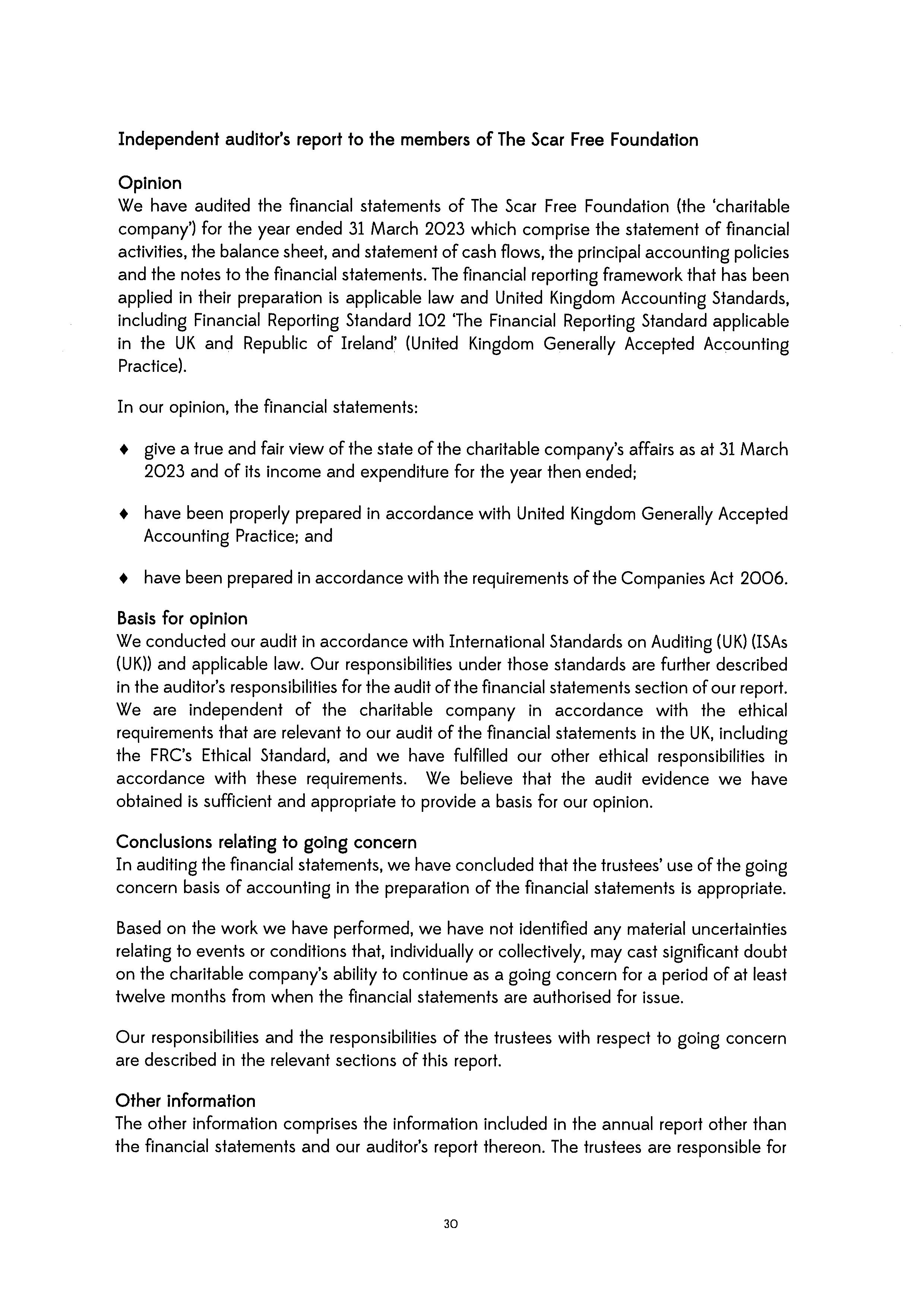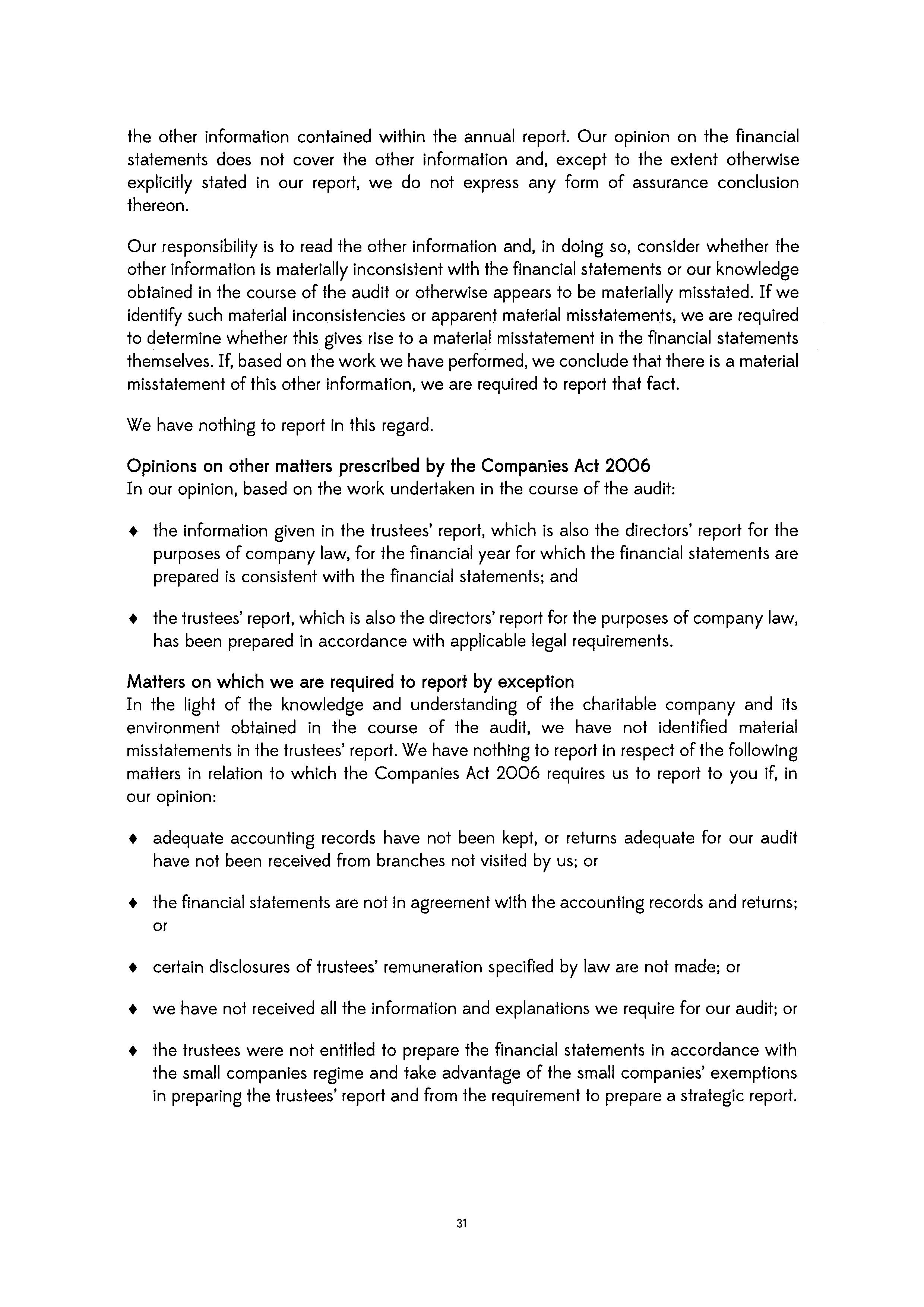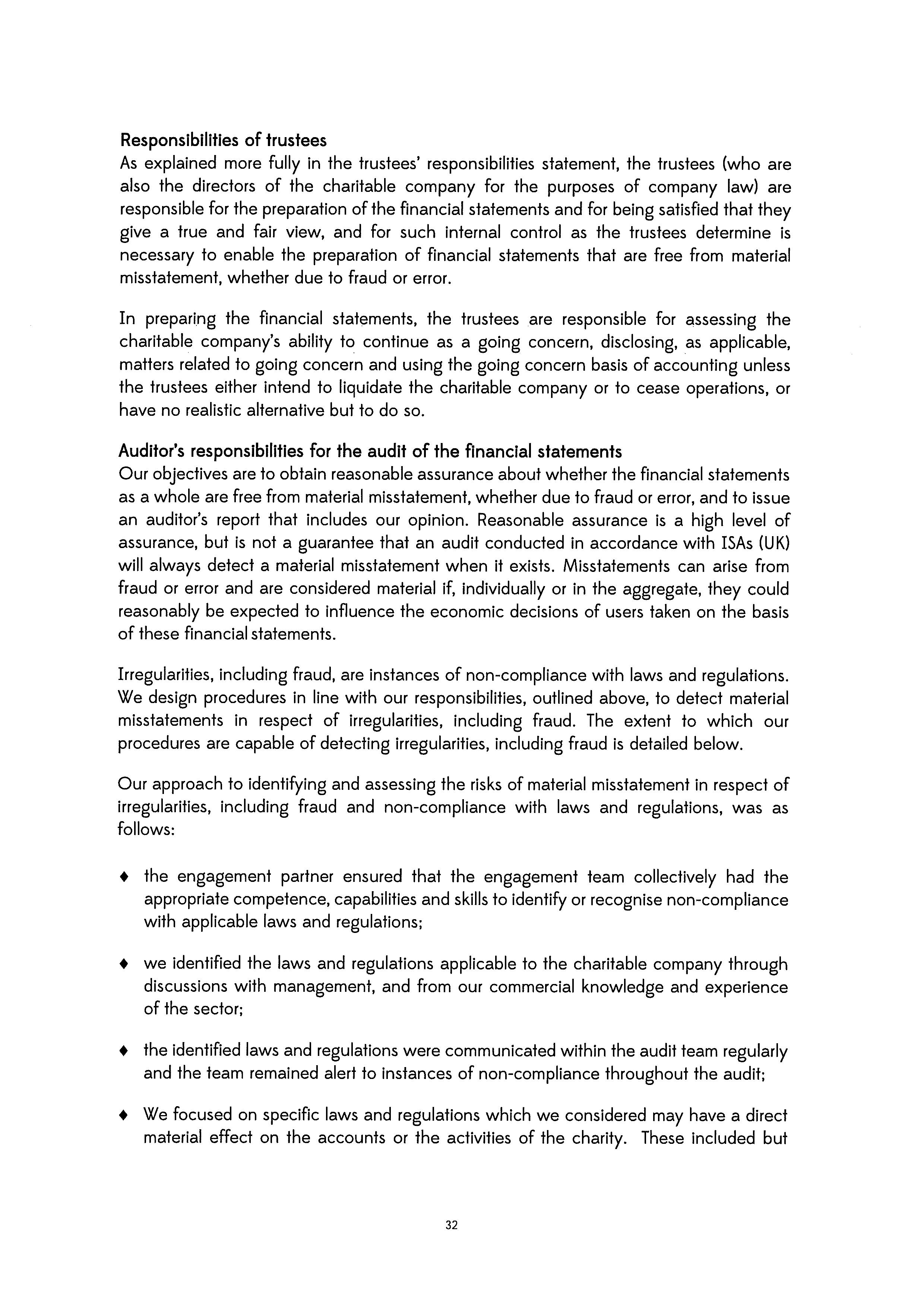
12 minute read
FUNDRAISING & COMMUNICATIONS
The pandemic and shortage of fundraising staff has inevitably delayed the process of rebuilding our Development Board and revitalising related fundraising activities with High Net Worth networks. We therefore worked to maintain our strong connection with existing supporters, new audiences, and in particular with Trusts and Foundations. Despite the challenges, income was secured as forecasted at £1,252,740 compared to £1,090,637 the previous year.
Major grants were secured from the Medical Research Council Early Career Researcher Support Fund and the CHEAR Foundation among others.
Advertisement
A huge thank you must also be extended to our Ambassadors; Karl Hinett, Kish Modasia, Jaco Nel, Irie Perera who have all fundraised for the Foundation throughout the year.
We were privileged to be able to hold multiple events throughout the year. This included;
A morning reception with HRH The Duchess of Edinburgh who visited the Royal College of Surgeons to celebrate International Women and Girls in Science Day The event allowed The Duchess to meet with friends and family of the Foundation, including British science journalist and author, Vivienne Parry OBE and our Scar Free research leads, including Professor Janet Lord CBE. Confirmed guests include pioneering women scientists, female philanthropists who make our work possible and our lived experience voices - the women and girls affected by scarring - who help to inspire our mission.
An evening reception, sponsored and hosted by the Ministry of Defence was also held to highlight the incredible work that is taking place at our Centre of Conflict Wound Research. On the night speakers included Major General Timothy Hodgetts - Head Army Medical Services, Scar Free research leads including Professor Janet Lord CBE, and members of the CASEVAC Club who actively participate in studies conducted within the Centre. Chair of the Armed Forces Covenant Fund, Helen Helliwell, was compere for the evening plus special guests including the Minister of Veteran Affairs the Rt Hon Johnny Mercer MP and the Minister for Defence People, Veterans and Service Families the Rt Hon Dr Andrew Murrison MP.
In October, we also hosted, our Annual Ambassador and Update Event at The Royal College of Surgeons. The Ambassador Event provided an opportunity for those with a lived experience of scarring to convene and discuss the challenges they face. This year’s event also involved the Foundation’s scientists, clinicians and researchers, where round-table discussions provided Ambassadors with an overview of our research and helped develop a sense of shared endeavour around research priorities and the important work that is being carried out.
The Annual Update Event, hosted by Trustee and Ambassador Hemani Modasia-Shah, included presentations from Dr Richard Moakes who works on the DeSCAR project, Oscar Pena Cabello who is researching scarring genes under Professor Paul Martin, and an inspiring speech from Ambassadors Sophie Dix and Delilah Care. Also at the event we filmed short videos to post engaging content across our social platforms to enable us to reach out beyond our stakeholders and supporters to help people understand the problems with scarring and the importance of funding our research.
We knew this would be a challenging year from a fundraising perspective, and we increased our efforts in presenting a compelling case for our unique cause, through the redeveloped strategy The year ahead is therefore critical to maintain the momentum built over the last 24 years, and to service the ambitious research strategy that leads to a world without scarring. We remain confident that we will catalyse opportunities to engage with donors and supporters over the coming year through our strengthened Research Strategy, our committed staff and our dedicated and supported volunteer fundraisers and Ambassadors.
In 2022/23 we grew our social media presence, thanks to the help of our Ambassadors, our Principal Member Organisations and the advice from Barley Communications – our Communications consultants. We have been able to highlight the problems people face when living with scarring and the research we are funding to aid our mission to a wider audience beyond our traditional supporters. Notably, in March 2023 one of our TikTok videos conveying an Ambassador’s story received engagement from over 10million people within a few weeks. We are confident that our important message of a world without scarring is reaching new and ever wider audiences.
We are very grateful to our Patron, HRH The Duchess of Edinburgh, for her constant support for our work. We were humbled to celebrate International Women and Girls in Science with HRH and grateful to the exposure her patronage provides us.
The Scar Free Foundation is registered with the Fundraising Regulator and subscribes to the Code of Fundraising Practice. During the year, no relationships were held with any commercial participators. Mr Kane Moore and Mrs Karla Conway, both former Foundation employees and now fundraising consultants, were engaged during the year to support our fundraising activity. Due diligence ensured that no conflict of interest existed that might impact this professional relationship and a written agreement was entered into between the Foundation and Mr Moore/Mrs Conway as prescribed by law. During the year, Mr Moore and Mrs Conway supported the fundraising function by providing advice but were not involved in soliciting or otherwise procuring any gifts directly from donors. In adopting best practice as laid out by the Fundraising Regulator, Trustees, staff, Mr Moore and Mrs Conway are sensitive to the issues of fundraising from people in vulnerable circumstances. Our core fundraising strategy, built on one-to-one, peer-driven personal approaches, lends itself to the identification and appropriate management of such issues.
Fundraising performance
Fundraised income for the year totalled £1,196,968 (£1,041,431 in 2022). Our Fundraising model continues to deliver to plan, with £327,611 (£351,688 in the previous year) expended on fundraising.
Principal Patrons
We would like to thank our Principal Patrons; surgeons and clinicians who so generously support our work through an ongoing annual gift. A Principal Patron’s commitment is so very important, underpinning the vital work that we do. During the year, we were fortunate to benefit from the support of the following:
• Ms Angelica Kavouni & Mr Lucian Ion
• Professor Vivien Lees
• Mr Nigel Mercer
• Professor Jonathan Sandy.
Volunteer help
The Scar Free Foundation relies on the help of volunteers in all aspects of its activities. This support is provided principally by members of the Board of Trustees, the Research Council and Research Advisory Panels who all give their time freely. We are also very grateful to our Scar Free Ambassadors, volunteers with lived experience of scarring, who help communicate the Scar Free ambition and ensure that a patient perspective is at the heart of our research; their stories convey more powerfully than anything else, the need for more research and activity in this area. We are grateful to all Ambassadors who give their time, honesty, understanding and support to attend events, workshops, meetings and premotion through our social media platforms. We would like to provide a special mention to our Young Ambassadors – Delilah Care for her incredibly inspiring speech at our Update Event and Elizabeth Soffe whose insistence for us all to be kind and her determination for her voice to be heard; makes us proud to call them both an Ambassador.
Finally, we are grateful to the CASEVAC Club of injured veterans from recent conflicts in Iraq and Afghanistan, and its co-founders David Wiseman and Dave Henson MBE for partnering with the Foundation on the Centre for Conflict Wound Research and our wider ambitions in this area Ambassador Karl Hinett, also a CASVEAC Club Member has gone beyond the call of duty this year, allowing his story to be shared via Virtual Reality Video, on the BBC, has raised money by taking part in gruelling marathons and presented at events on behalf of the Centre of Conflict Wound Research.
Plans For Future Periods
The pursuit of scar free healing through the implementation of our refreshed Scar Free Strategy remains our central goal. We believe that we can relate the Scar Free narrative even more compellingly in order to engage a new cohort of donors, researchers and people living with scarring, to partner with us in this life changing mission. Looking forward, in the financial year 2023/24, the research programmes we develop will be focused on three updated objectives; subject to the availability of funds, we will work to:
• Identify the biological pathways which lead to scarring.
• Change these pathways to prevent or improve scarring.
• Support people living with scars.
In collaboration with clinicians, scientists and people with a lived experience of scarring, we have developed a research funding plan with which we will deliver our ambitious Scar Free Research Strategy The plan encompasses a bold programme of scientific, clinical and psychological research which addresses patient relevant research for people encountering or living with scarring today, along with scientific endeavour which will deliver scar free healing for future generations.
In the year ahead we will support existing work and, subject to the availability of funds, launch funding calls to address our new research endeavours.
Embed our refreshed Case for Support – informed by our re-presented Scar Free Research Strategy, we will also present a new fundraising Case for Support that will be the cornerstone in our building of new donor networks. We will work hard during the year to identify new and fully engaged volunteer leadership to drive our refreshed fundraising activities.
The lived experience voice lies at the heart of our work – the impact of our work is only measured by the benefits we can deliver, through new treatments and understandings, to people who encounter and live with scarring conditions. We will continue to invest more time and resource to ensure that the voices and experiences of those with scars are felt at every level and in every aspect of the charity’s work, across our social platforms, research projects and governance structures.
The Charity Governance Code has been adopted by the Foundation and the Code’s principles are regularly revisited by the Chief Executive and the Board.
Financial Review
During the year, our spend on research decreased due to the completion of research projects from a spend of £1,513,541 in 2021/22 to £1,281,414 in 2022/23
A review of the schedule comparing commitments against available restricted and designated funds is reviewed every year by our auditors Buzzacott. The latest review conducted in May 2023 confirmed the Foundation’s position that all commitments are adequately provided for.
We end the year carrying forward reserves that both match our stated policy to provide sufficient, but not excessive, core funding, and the reassurance that all research commitments can be fully funded through existing restricted and designated funds.
Reserves Policy
The Scar Free Foundation has restricted funds which have been, and will be, generated through fundraising. Depending on the specified restriction, these will be either used to generate further funding to establish and maintain our major research programmes or used directly on particular research projects.
We continue to retain sufficient unrestricted funds to meet on-going core costs. The aim is to maintain sufficient unrestricted reserves to cover core costs for a 12-month period and to meet redundancy costs should the Foundation ever have to be closed down.
Unrestricted reserves at the end of March 2023 were £938,557 (£838,797 2021/22) of which £707,408 was in the general funds and constitutes free reserves. The core-costs for 2023/24 are forecast to be approximately £580,000. The free reserves are therefore in line with the target set out above. The team are not complacent and are keen to push forward with a strong fundraising strategy.
Investment Policy
Investments are managed by Sarasin Partners LLP, our investment manager and adviser, through their Alpha range of Common Investment Funds.
The Trustees have established an overall investment policy, which involves the Foundation’s available funds being categorised in one of two ways, for each of which there is an appropriate investment policy, namely:
Short term - in this category are funds which are budgeted for spending within a two-year period. These will be held in appropriate bank accounts, term deposits or liquidity funds, with the maturity of the deposits being managed to match both the liabilities and maximise the interest earned on them.
Medium and long term – Most of the funds in this category are not required within five years, but some of which will be spent between two and five years from 31 March 2023. They are invested in both longer term deposit accounts and in the Alpha Common Investment Fund for Endowments. This fund seeks long-term capital and income growth from a broadly diversified portfolio, of which 70% would normally be in shares with the balance in bonds, cash, property and alternative assets.
The use of Common Investment Funds enables the Foundation to access asset classes which might otherwise be closed to it and to achieve appropriate diversification and a broad spread of risk. These Common Investment Funds are charities in their own right, pooling the funds of other charities with these similar objectives.
The Alpha funds will make substantial asset allocation changes when necessary to protect capital, reduce volatility and enhance long-term returns. The selection of individual shareholdings is guided by a global, thematic research process which incorporates an ethical screening process. The Trustees regularly review with Sarasin & Partners the Foundation’s Investment Policy and the performance of these funds and make any appropriate changes in light of the Foundation’s development, changes in markets or any other relevant factors.
Our investments decreased in value by 32% over the financial year 2022/23. During the year we transferred funds from out of investments and consequently the total investments decreased. We remain vigilant to a potential volatile market that the war in Ukraine and fall out from the pandemic may create and mindful that the funds in Sarasin’s are long term investments.
Risk Assessment
The Board maintains a risk assessment system which is based on a numerical assessment of risk, with an accompanying management commentary, and Trustees consider these reports each quarter. The aim is to highlight and measure potential risks to the success of an activity or process, assess the impact and put in place appropriate management action.
Accordingly, we can confirm that the major risks to which the Foundation is exposed have been reviewed and actions are in place to mitigate those risks.
Current risks of greatest concern (i.e. the risks with greatest combined ‘impact’ and ‘likelihood’ score in the Trustees' quarterly risk assessment exercise) include:
1. Fundraising Issues: Delay in building a high-net-wealth networking infrastructureEfforts to expand income sources through the development of the Case for Support and in-person donor events are paramount.
2. Financial Issues: Income/expenditure imbalance threatens ‘going concern’ status of charity – We maintain a prudent level of reserves, reviewed quarterly. Control costs and maximise income.
3. Management Issues: Unplanned loss of senior staff and delay in recruiting staff – We will maintain active succession planning and recruitment oversight
Responsibilities Of The Trustees
The Trustees are responsible for preparing the Report of the Trustees and the financial statements in accordance with applicable law and regulations.
Company Law requires the Trustees to prepare financial statements for each financial year. Under that law the Trustees have elected to prepare the financial statements in accordance with UK Generally Accepted Accounting Practice (UK Accounting Standards and applicable law). Under company law the Trustees must not approve the financial statements unless they are satisfied that they give a true and fair view of the state of the affairs of the charitable company and the income or expenditure of the charitable company for that period.
In preparing these financial statements, the Trustees are required to:
• Select suitable accounting policies and then apply them consistently.
• Observe the methods and principles in Accounting and Reporting by Charities: Statement of Recommended Practice applicable to charities preparing their accounts in accordance with the Financial Reporting Standard applicable to the United Kingdom and Republic of Ireland (FRS 102).
• Make judgements and estimates that are reasonable and prudent.
• State whether applicable UK Accounting Standards (United Kingdom Generally Accepted Accounting Practice) have been followed, subject to any material departures disclosed and explained in the financial statements.
• Prepare the financial statements on the “going concern” basis unless it is inappropriate to assume that the company will continue in operation.
The Trustees are responsible for keeping proper accounting records that are sufficient to show and explain the charitable company’s transactions and disclose with reasonable accuracy at any time the financial position of the charitable company and enable them to ensure that the financial statements comply with the Companies Act 2006. They are also responsible for safeguarding the assets of the charitable company and hence for taking reasonable steps for the prevention and detection of fraud and other irregularities.
The Trustees are responsible for the maintenance and integrity of the corporate and financial information included on the charitable company's website. Legislation in the United Kingdom governing the preparation and dissemination of the financial statements may differ from legislation in other jurisdictions.
Each of the Trustees confirms that to the best of his/her knowledge there is no information relevant to the audit of which the auditors are unaware. Each of the Trustees also confirms that he/she has taken all necessary steps to ensure that he/she is aware of all relevant audit information and that this information has been communicated to the auditors.
The Trustees
Trustees, who are also Directors under company law, who served during the year and up to the date of this report were as follows:
Professor Sir Bruce Keogh (Chairman)
Mr David Allen (retiringon18July 2023)
Mr Simon Boadle (retired7February 2023)
Mr Richard Collier (Honorary Treasurer)
Ms Alison Clarke
Ms Hemani Modasia-Shah
Lt Gen Richard Nugee (retired 15April 2023)
Mr Tim Streatfeild
Mrs Alexandra Thrower
Professor Peter Weissberg (Research Council Chairman)
Members of the charitable company guarantee to contribute an amount not exceeding £1 to the assets of the charitable company in the event of winding up. The total number of such guarantees at 31 March 2023 was £6 (2022 – £6). The Trustees have no beneficial interest in the charitable company.
Approved by the Trustees on 18 July 2023 and signed on their behalf by
Professor Sir Bruce Keogh Chairman





